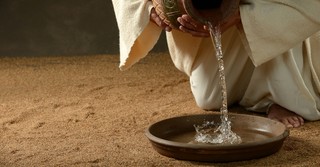
- Recent Translations
- All Translations
Luke 7
Share
Settings
A Roman Commander Has Faith
1 Jesus finished saying all those things to the people. Then he entered Capernaum.Jesus Raises a Widow's Son From the Dead
11 Some time later, Jesus went to a town called Nain. His disciples and a large crowd went along with him.Jesus and John the Baptist
18 John's disciples told him about all these things. So he chose two of them.A Sinful Woman Pours Perfume on Jesus
36 One of the Pharisees invited Jesus to have dinner with him. So he went to the Pharisee's house. He took his place at the table.Videos for Luke 7

Luke 7 Commentary
Chapter 7
The centurion's servant healed. (1-10) The widow's son raised. (11-18) John the Baptist's inquiry concerning Jesus. (19-35) Christ anointed in the house of the Pharisee The parable of the two debtors. (36-50)
Verses 1-10 Servants should study to endear themselves to their masters. Masters ought to take particular care of their servants when they are sick. We may still, by faithful and fervent prayer, apply to Christ, and ought to do so when sickness is in our families. The building places for religious worship is a good work, and an instance of love to God and his people. Our Lord Jesus was pleased with the centurion's faith; and he never fails to answer the expectations of that faith which honours his power and love. The cure soon wrought and perfect.
Verses 11-18 When the Lord saw the poor widow following her son to the grave, he had compassion on her. See Christ's power over death itself. The gospel call to all people, to young people particularly, is, Arise from the dead, and Christ shall give you light and life. When Christ put life into him, it appeared by the youth's sitting up. Have we grace from Christ? Let us show it. He began to speak: whenever Christ gives us spiritual life, he opens the lips in prayer and praise. When dead souls are raised to spiritual life, by Divine power going with the gospel, we must glorify God, and look upon it as a gracious visit to his people. Let us seek for such an interest in our compassionate Saviour, that we may look forward with joy to the time when the Redeemer's voice shall call forth all that are in their graves. May we be called to the resurrection of life, not to that of damnation.
Verses 19-35 To his miracles in the kingdom of nature, Christ adds this in the kingdom of grace, To the poor the gospel is preached. It clearly pointed out the spiritual nature of Christ's kingdom, that the messenger he sent before him to prepare his way, did it by preaching repentance and reformation of heart and life. We have here the just blame of those who were not wrought upon by the ministry of John Baptist or of Jesus Christ himself. They made a jest of the methods God took to do them good. This is the ruin of multitudes; they are not serious in the concerns of their souls. Let us study to prove ourselves children of Wisdom, by attending the instructions of God's word, and adoring those mysteries and glad tidings which infidels and Pharisees deride and blaspheme.
Verses 36-50 None can truly perceive how precious Christ is, and the glory of the gospel, except the broken-hearted. But while they feel they cannot enough express self-abhorrence on account of sin, and admiration of his mercy, the self-sufficient will be disgusted, because the gospel encourages such repenting sinners. The Pharisee, instead of rejoicing in the tokens of the woman's repentance, confined his thoughts to her former bad character. But without free forgiveness none of us can escape the wrath to come; this our gracious Saviour has purchased with his blood, that he may freely bestow it on every one that believes in him. Christ, by a parable, forced Simon to acknowledge that the greater sinner this woman had been, the greater love she ought to show to Him when her sins were pardoned. Learn here, that sin is a debt; and all are sinners, are debtors to Almighty God. Some sinners are greater debtors; but whether our debt be more or less, it is more than we are able to pay. God is ready to forgive; and his Son having purchased pardon for those who believe in him, his gospel promises it to them, and his Spirit seals it to repenting sinners, and gives them the comfort. Let us keep far from the proud spirit of the Pharisee, simply depending upon and rejoicing in Christ alone, and so be prepared to obey him more zealously, and more strongly to recommend him unto all around us. The more we express our sorrow for sin, and our love to Christ, the clearer evidence we have of the forgiveness of our sins. What a wonderful change does grace make upon a sinner's heart and life, as well as upon his state before God, by the full remission of all his sins through faith in the Lord Jesus!